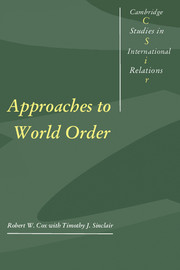Book contents
- Frontmatter
- Contents
- Preface
- Acknowledgements
- Part I Overviews
- Part II Theory
- Part III Interpretations
- 10 The global political economy and social choice (1991)
- 11 “Real socialism” in historical perspective (1991)
- 12 Structural issues of global governance: implications for Europe (1991)
- 13 Middlepowermanship, Japan, and future world order (1989)
- 14 Production and security (1993)
- 15 Global perestroika (1992)
- Part IV Multilateralism
- Complete bibliography of works by Robert W. Cox to 1995
- Index of names
- Index of subjects
- CAMBRIDGE STUDIES IN INTERNATIONAL RELATIONS
13 - Middlepowermanship, Japan, and future world order (1989)
Published online by Cambridge University Press: 05 June 2012
- Frontmatter
- Contents
- Preface
- Acknowledgements
- Part I Overviews
- Part II Theory
- Part III Interpretations
- 10 The global political economy and social choice (1991)
- 11 “Real socialism” in historical perspective (1991)
- 12 Structural issues of global governance: implications for Europe (1991)
- 13 Middlepowermanship, Japan, and future world order (1989)
- 14 Production and security (1993)
- 15 Global perestroika (1992)
- Part IV Multilateralism
- Complete bibliography of works by Robert W. Cox to 1995
- Index of names
- Index of subjects
- CAMBRIDGE STUDIES IN INTERNATIONAL RELATIONS
Summary
“Middle power” and “functionalism” were key terms in John Holmes’ work. His was perhaps the most articulate expression of the thought behind Canadian diplomacy in the reconstruction of international organization after World War II. Although the great powers, and in the first place the United States, were, in Dean Acheson's words, “present at the creation,” Canada and other middle and smaller powers were, as Holmes underscored, “also present.”
Canada's contribution, in Holmes’ thinking, should not be just to claim a place for the assertion of particularistic national interests. Beyond such particulars, Canada had an overriding interest in the development of institutions and practices conducive to peace, tranquility, and orderly adjustment in world politics. Middle powers, the general category of which Canada was an exemplar, could be an important influence to this end because, unlike great powers, they were not suspected of harboring intentions of domination, and because they had resources sufficient to enable them to be functionally effective.
This in substance was the Canadian doctrine of functionalism, although “doctrine” is a word that rests uneasily in relation to the flexible subtlety of John Holmes’ mind. In coining the term “middle-powermanship,” reminiscent of “brinksmanship” and “one-upmanship,” he introduced a note of irony and autocriticism in the affirmation of the middle-power role. He was impatient with a certain smugness tending to hypocrisy that he sometimes perceived in the professional advocacy of Canada's external relations.
- Type
- Chapter
- Information
- Approaches to World Order , pp. 241 - 275Publisher: Cambridge University PressPrint publication year: 1996
- 12
- Cited by



